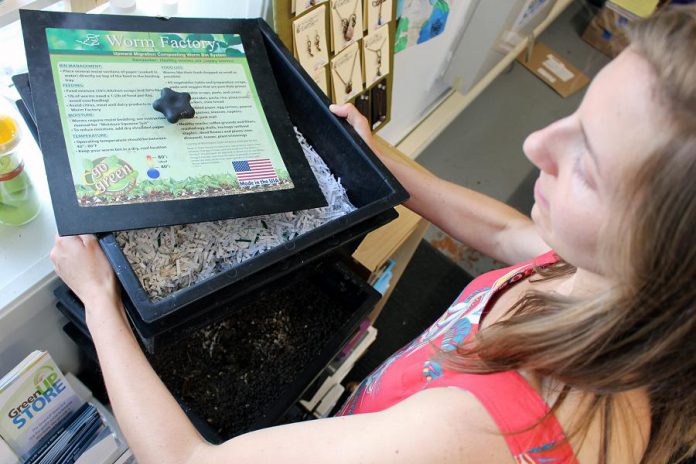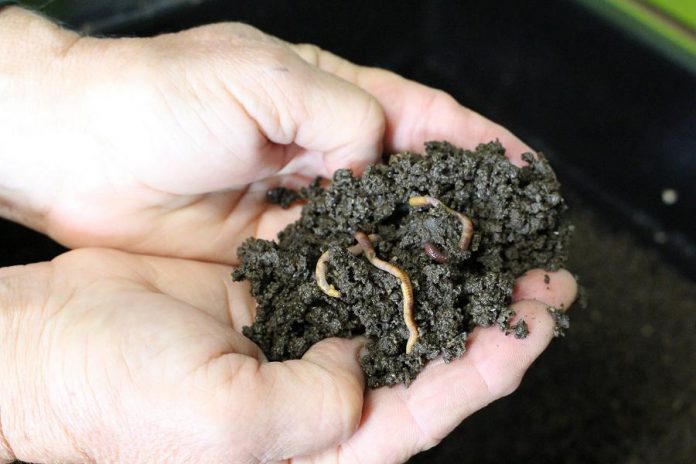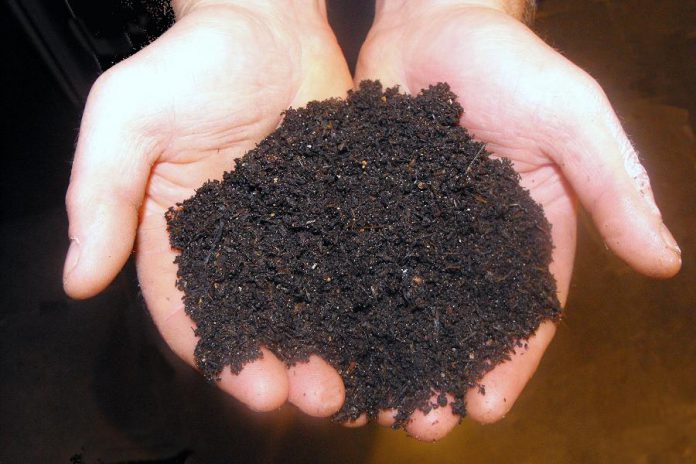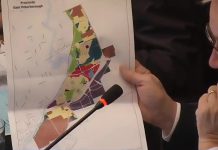
Looking to take composting to the next level at your home, office, or school?
Vermicomposting is the use of red wiggler worms to convert your kitchen and lunchroom waste into fertilizer. Not only does it benefit your garden and house plants, it also helps to cut down on the amount of waste going to landfill.
Vermicomposting is ideal for classrooms, office lunchrooms, and apartment living because it can be done indoors. This type of composting usually requires a bit more attention than an outdoor composter, but there is no heavy, physical work involved, and worms produce a high-quality plant fertilizer that is a great additive for houseplants and outdoor soil.
Worm bins are available at the GreenUP Store or you can improvise and make your own. Vermicomposting has become quite popular and there are now several bin options available depending on your budget, volume of compost, and number of people contributing scraps to the bin.
To get started on your own, you can cut a hole in the side of a Rubbermaid container and fix a screen in the side to allow for ventilation. The benefit of this method is that you can select a bin that properly fits in your space. For example, if you live in an apartment or have limited space, you could choose a bin to fit perfectly under your sink or kitchen cupboard, where it will be in a dark place and out of the way. The bin you choose will need a secure lid to keep your worms contained.
Once you select your bin, you will need to add some shredded newspaper and a bit of soil as bedding, and then you just need to add Red Wiggler worms.
Red Wigglers are a special species of vermicomposting worm that are efficient at breaking down and transforming food scraps quickly into compost as they pass through the worm’s body.
Red Wigglers are not the type of worms we see in the garden. They are a smaller, slimmer-bodied worm with a red body. Red Wigglers are not usually found at bait shops so they must be specially ordered for compost bins. A quick Google search will bring up several local suppliers of Red Wigglers.

These worms will eat almost anything that humans will, but much like an outdoor composter, meat, bones, cheese, or anything with cooking oil on it, should not be placed in an indoor vermicomposter. Avoid unpleasant odours by sticking to veggie scraps, eggshells, and fruits.
Once you get the hang of it, feeding worms in the bin is quite easy and they only need to be fed once or twice per week. Each time you fed them, check the moisture level to ensure that it isn’t too dry or too wet.
Ideally, the bedding should be as moist as a wrung-out sponge. If the bin gets too wet, then there is likely too much food for the number of worms in the bin, and the bin may be too small for the quantity of food being added. That is when worms may try to vacate the bin. Classrooms and larger office lunchrooms may need to consider multiple bins to accommodate the volume of scraps being added.
You can avoid fruit flies from taking up in your bin by lifting up the bedding material and placing the food scraps an inch or more below the surface of the bin. This technique allows the worms to consume their meal where they are buried and avoids peels from being exposed on the top where fruit flies could easily breed.

The most rewarding part of vermicomposting is when you have accumulated some worm castings in your bin. After earthworms digest the scraps, the rich, organic matter that is excreted is a nutrient rich waste, is great for plants.
Worm castings are 100 per cent organic and are full of nutrients that are easily absorbed by plant roots. They also contain microbes that help your plants become more disease resistant and better able to repel pests.
There are a few ways to harvest worm castings. My favourite method is to chose a warm, sunny day and spread the contents of the bin outside on a small sheet. Since worms do not like the light, they move deeper into the pile. Then, castings can be removed from the outer edges.
If you would like some guidance getting started, stop in at GreenUP Ecology Park and check out the worm bin set up in the composting demonstration area, or pop into the GreenUP Store at 378 Aylmer Street N. in downtown Peterborough to see our demo unit. We carry worm bins, and resources to get you started. For questions or more information, give the GreenUP Store a call at 705-745-3238.


























